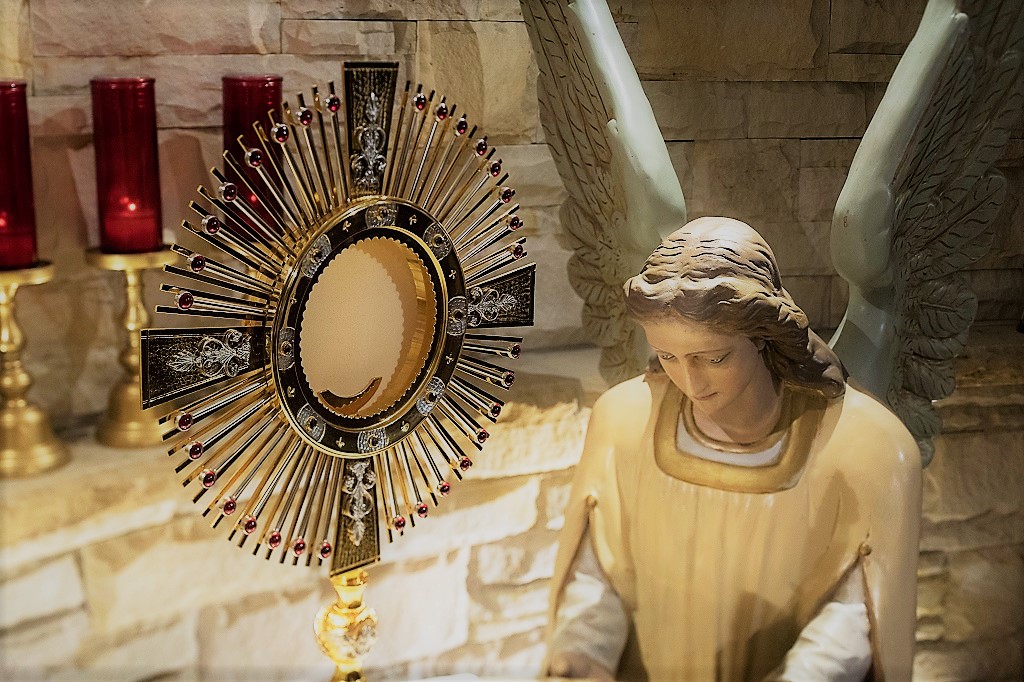His hour had not yet come. The “Jews”( codeword in the Gospel of John for that subset of Jewish people who opposed Jesus), were out to get Jesus. They wanted to kill him, to wipe him from the face of the earth, to put an end once and for all to this one who was obnoxious to them. Our reading from the Book of Wisdom reveals harshly to us the mind of those who wish to kill God’s Just One. Wisdom also tells us that those who do so think themselves able to put God to the test, able to thwart the plans of God.
His hour had not yet come. They had tried to arrest him, they had forced Jesus to move about in a hidden way. And yet he was still recognized, the people still knew who this Just One was and that he is the Christ. What would someone have thought who was there, who saw Jesus in Jerusalem for the feast of Tabernacles? He was not, at least for the moment, teaching on the mountaintop or in the Temple, but he was still clearly the Christ, the one sent by the Father.
His hour had not yet come. The Jewish authorities, those who opposed Jesus, thought that they were in charge. This pattern had repeated itself many times: a prophet arises, a bunch of desperate people follow him, the prophet is killed, the story ends. In the minds of those in charge, Jesus was nothing more than another instance of this story, and they were in charge of the ending. Time to take charge and end the story.
His hour had not yet come. Even the people had doubts about Jesus. “But we know where he is from. When the Christ comes, no one will know where he is from.” The Christ is supposed to be unknown to them, someone with an enigmatic history and a story that does not look like the story of our lives. Somehow or other the Christ, the anointed one of God, the savior, is supposed to be drastically different than the rest of us, a Superman figure. But they know that Jesus is from Nazareth, and that he is the son of Joseph and Mary. This must rule him out.
His hour had not yet come. Jesus reminds us that God is in charge. The will of the Father will not be thwarted, will not be undone. Nor will the plan of God bend to the ordinary rules of human engagement: politics and power and expectation. In the plan of God, Jesus was not supposed to be arrested yet, he was not supposed to die yet. And so he did not. Perhaps the story really is that simple: God has not willed it, it has not happened. Period.
His hour had not yet come. What happens when his “hour” does come? What then? Is God still the one in charge? Or does he cede control to someone or something else? Is the plan of God still moving forward at that “hour”? No one laid a hand upon him, because his hour had not yet come. Soon enough, they will lay a hand upon him, and much more than that.
Yet I did not come on my own. Jesus was – is – sent by the Father do to the will of the Father. Nothing more, nothing less. The will of the Father is that he die on the cross and rise to new life to save our lives. And nothing, no one, will stop him.
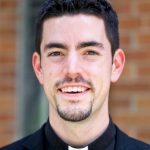 Fr. Scott Nolan is a priest of the Diocese of Grand Rapids and serving as the Pastor of St. Stephen Parish in East Grand Rapids, MI.
Fr. Scott Nolan is a priest of the Diocese of Grand Rapids and serving as the Pastor of St. Stephen Parish in East Grand Rapids, MI.
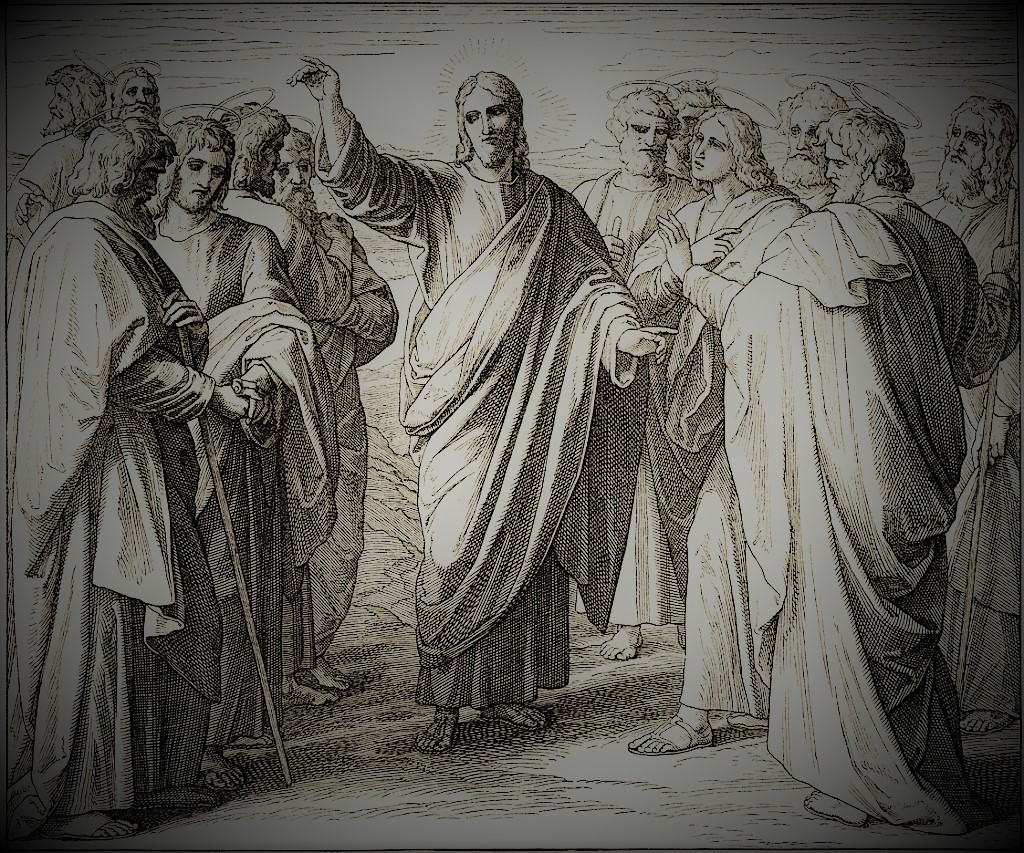

 Edward A. Morse if a professor of law at Creighton University. He says, “My wife and I have five children. Two are Creighton alumni, two are Creighton students, and one is still at home with us. We live on the farm on which I was raised and continue to help operate part of it. These agrarian roots influence our lives in various ways, and sometimes that influence can be seen in these reflections.” [This reflection is used with permission from Creighton University’s Online Ministries.]
Edward A. Morse if a professor of law at Creighton University. He says, “My wife and I have five children. Two are Creighton alumni, two are Creighton students, and one is still at home with us. We live on the farm on which I was raised and continue to help operate part of it. These agrarian roots influence our lives in various ways, and sometimes that influence can be seen in these reflections.” [This reflection is used with permission from Creighton University’s Online Ministries.]
 Elise Hilton is an author, blogger and speaker. Her role at Diocesan Publications is Editor & Writer with the Marketing Team. She has worked in parish faith formation and Catholic education for over 25 years. A passionate student of theology, Elise enjoys sharing her thoughts on parish communication, the role of social media in the Church, Franciscan spirituality and Catholic parenting. To enquire about booking her as a speaker, please contact her at
Elise Hilton is an author, blogger and speaker. Her role at Diocesan Publications is Editor & Writer with the Marketing Team. She has worked in parish faith formation and Catholic education for over 25 years. A passionate student of theology, Elise enjoys sharing her thoughts on parish communication, the role of social media in the Church, Franciscan spirituality and Catholic parenting. To enquire about booking her as a speaker, please contact her at 
 Allison Gingras, founder
Allison Gingras, founder 
 Today’s guest blogger is Michael Kavan, currently the Associate Dean for Student Affairs at Creighton University School of Medicine. He is also a psychologist and a Professor of Family Medicine and Professor of Psychiatry. A faculty member at Creighton since 1988, Kavan teaches classes on a variety of topics related to behavioral medicine, depression, anxiety, and interviewing skills for medical students and residents. He also practices psychology at a family medicine clinic.
Today’s guest blogger is Michael Kavan, currently the Associate Dean for Student Affairs at Creighton University School of Medicine. He is also a psychologist and a Professor of Family Medicine and Professor of Psychiatry. A faculty member at Creighton since 1988, Kavan teaches classes on a variety of topics related to behavioral medicine, depression, anxiety, and interviewing skills for medical students and residents. He also practices psychology at a family medicine clinic.
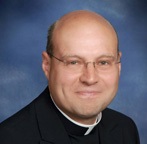 Fr. Peter Damian, 38, is a native of Romania. Growing up under Ceausescu’s Communist regime, in a Christian Orthodox family, he became Catholic at age 19 after a deep search for Truth. Providence took him to Italy, where he attended seminary in the Diocese of Massa Carrara-Pontremoli, followed by post-seminary studies in Rome, at the Pontifical Lateran University. He was ordained a priest on April 2nd, 2005, the very same day St. John Paul II went to Heaven.
Fr. Peter Damian, 38, is a native of Romania. Growing up under Ceausescu’s Communist regime, in a Christian Orthodox family, he became Catholic at age 19 after a deep search for Truth. Providence took him to Italy, where he attended seminary in the Diocese of Massa Carrara-Pontremoli, followed by post-seminary studies in Rome, at the Pontifical Lateran University. He was ordained a priest on April 2nd, 2005, the very same day St. John Paul II went to Heaven. 

 Author Nancy Shirley is a grateful child of God, wife, mother, nana, and nursing professor. My husband and I met at church and have walked this extraordinary journey together experiencing CEC in 2004 and growing more committed to our beliefs. In addition to my husband, I am blessed with a wonderful daughter and son, who in turn are blessed with wonderful spouses. My son’s four children bring us all endless joy and delight. I am on the faculty at Creighton having taught nursing here from 1980-1989 and returning “home” in 2003 to teach nursing at all levels and to administer the undergraduate program. [Today’s reflection is used with permission from Creighton University.]
Author Nancy Shirley is a grateful child of God, wife, mother, nana, and nursing professor. My husband and I met at church and have walked this extraordinary journey together experiencing CEC in 2004 and growing more committed to our beliefs. In addition to my husband, I am blessed with a wonderful daughter and son, who in turn are blessed with wonderful spouses. My son’s four children bring us all endless joy and delight. I am on the faculty at Creighton having taught nursing here from 1980-1989 and returning “home” in 2003 to teach nursing at all levels and to administer the undergraduate program. [Today’s reflection is used with permission from Creighton University.]
 Tommy Shultz is Diocesan Publication’s Solutions Evangelist. He is also a full time speaker who was most recently the Director of youth and young adult ministries for the Diocese of Baker, OR. As an experienced speaker on all things Catholic, he has addressed thousands of teens and young adults on topics such as the Sacraments, chastity, and boldly living the Catholic faith. He has given many talks and hosted retreats across the nation. Driven by his passion for Theology of the Body, Tommy studied at the Theology of the Body Institute and has spoken at numerous Theology of the Body conferences. From 2012-2013, he served as a missionary of purity, speaking to over 20 thousand youth about the message of purity across the state of Pennsylvania. He is also a founder of the Corpus Christi Theology of the Body campus organization at Franciscan University. To book Tommy for an event or for further information please visit
Tommy Shultz is Diocesan Publication’s Solutions Evangelist. He is also a full time speaker who was most recently the Director of youth and young adult ministries for the Diocese of Baker, OR. As an experienced speaker on all things Catholic, he has addressed thousands of teens and young adults on topics such as the Sacraments, chastity, and boldly living the Catholic faith. He has given many talks and hosted retreats across the nation. Driven by his passion for Theology of the Body, Tommy studied at the Theology of the Body Institute and has spoken at numerous Theology of the Body conferences. From 2012-2013, he served as a missionary of purity, speaking to over 20 thousand youth about the message of purity across the state of Pennsylvania. He is also a founder of the Corpus Christi Theology of the Body campus organization at Franciscan University. To book Tommy for an event or for further information please visit 
 Amy Oatley is a wife, mother, and Secular Franciscan (OFS), passionate about social justice, advocating for the dignity of every human life. She encounters Christ through Prison and Jail Ministry in the Diocese of Grand Rapids and as a Sidewalk Advocate for Life. A journalist for the past thirty years, she is currently a freelance writer for FAITH Magazine and works at St. Thomas the Apostle Parish. Her home parish is Our Lady of Consolation in Rockford, Michigan.
Amy Oatley is a wife, mother, and Secular Franciscan (OFS), passionate about social justice, advocating for the dignity of every human life. She encounters Christ through Prison and Jail Ministry in the Diocese of Grand Rapids and as a Sidewalk Advocate for Life. A journalist for the past thirty years, she is currently a freelance writer for FAITH Magazine and works at St. Thomas the Apostle Parish. Her home parish is Our Lady of Consolation in Rockford, Michigan.
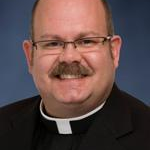 Fr. Ron Hutchinson
Fr. Ron Hutchinson